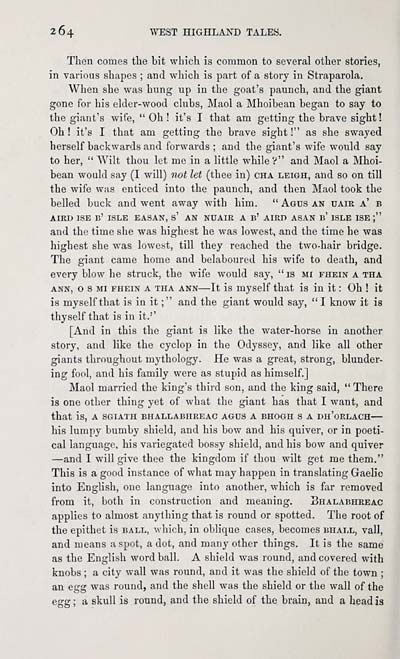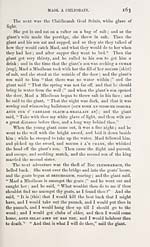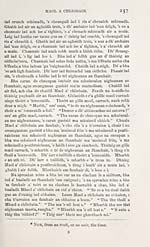Download files
Complete book:
Individual page:
Thumbnail gallery: Grid view | List view

264 WEST HIGHLAND TALES.
Then comes tlie bit which is common to several other stories,
in various shapes ; and which is part of a story in Straparola.
When she was hung up in the goat's paunch, and the giant
gone for his elder-wood cluhs, Maol a Mhoibean began to say to
the giant's wife, " Oh ! it's I that am getting the brave sight !
Oh ! it's I that am getting the brave sight !" as she swayed
herself backwards and forwards ; and the giant's wife would say
to her, " Wilt thou let me in a little while?" and Maol a Mhoi-
bean would say (I will) not let (thee in) cha leigh, and so on till
the wife was enticed into the paunch, and then Maol took the
belled buck and went away with him. " Agus an uair a' b
AIRD ISE b' isle EASAN, s' AN NOAIR A b' AIRD ASAN b' ISLE ISE ;"
and the time she was highest he was lowest, and the time he was
highest she was lowest, till they reached the two-hair bridge.
The giant came home and belaboured his wife to death, and
every blow he struck, the wife would say, " 13 mi fhein a tha
ANN, o s mi fhein A THA ANN — It is myself that is in it : Oh ! it
is myself that is in it ;" and the giant would say, " I know it is
thyself that is in it.''
[And in this the giant is like the water-horse in another
story, and like the cyclop in the Odyssey, and like all other
giants throughout mythology. He was a great, strong, blunder-
ing fool, and his family were as stupid as himself.]
Maol married the king's third son, and the king said, " There
is one other thing yet of what the giant has that I want, and
that is, A SGIATII BHALLABIIREAC AGUS A BHOGH S A Dh'oRLACH —
his lumpy bumby shield, and his bow and his quiver, or in poeti-
cal language, his variegated bossy shield, and his bow and quiver
— and I will give thee the kingdom if thou wilt get me them."
This is a good instance of what may happen in translating Gaelic
into English, one language into another, which is far removed
from it, both in construction and meaning. Bhalabhreac
applies to almost anything that is round or spotted. The root of
the epithet is ball, which, in oblique cases, becomes bhall, vail,
and means a spot, a dot, and many other things. It is the same
as the English word ball. A shield was round, and covered with
knobs ; a city wall was round, and it was the shield of the town ;
an egg was round, and the shell was the shield or the wall of the
egg; a skull is round, and the shield of the brain, and a head is
Then comes tlie bit which is common to several other stories,
in various shapes ; and which is part of a story in Straparola.
When she was hung up in the goat's paunch, and the giant
gone for his elder-wood cluhs, Maol a Mhoibean began to say to
the giant's wife, " Oh ! it's I that am getting the brave sight !
Oh ! it's I that am getting the brave sight !" as she swayed
herself backwards and forwards ; and the giant's wife would say
to her, " Wilt thou let me in a little while?" and Maol a Mhoi-
bean would say (I will) not let (thee in) cha leigh, and so on till
the wife was enticed into the paunch, and then Maol took the
belled buck and went away with him. " Agus an uair a' b
AIRD ISE b' isle EASAN, s' AN NOAIR A b' AIRD ASAN b' ISLE ISE ;"
and the time she was highest he was lowest, and the time he was
highest she was lowest, till they reached the two-hair bridge.
The giant came home and belaboured his wife to death, and
every blow he struck, the wife would say, " 13 mi fhein a tha
ANN, o s mi fhein A THA ANN — It is myself that is in it : Oh ! it
is myself that is in it ;" and the giant would say, " I know it is
thyself that is in it.''
[And in this the giant is like the water-horse in another
story, and like the cyclop in the Odyssey, and like all other
giants throughout mythology. He was a great, strong, blunder-
ing fool, and his family were as stupid as himself.]
Maol married the king's third son, and the king said, " There
is one other thing yet of what the giant has that I want, and
that is, A SGIATII BHALLABIIREAC AGUS A BHOGH S A Dh'oRLACH —
his lumpy bumby shield, and his bow and his quiver, or in poeti-
cal language, his variegated bossy shield, and his bow and quiver
— and I will give thee the kingdom if thou wilt get me them."
This is a good instance of what may happen in translating Gaelic
into English, one language into another, which is far removed
from it, both in construction and meaning. Bhalabhreac
applies to almost anything that is round or spotted. The root of
the epithet is ball, which, in oblique cases, becomes bhall, vail,
and means a spot, a dot, and many other things. It is the same
as the English word ball. A shield was round, and covered with
knobs ; a city wall was round, and it was the shield of the town ;
an egg was round, and the shell was the shield or the wall of the
egg; a skull is round, and the shield of the brain, and a head is
Set display mode to: Large image | Transcription
Images and transcriptions on this page, including medium image downloads, may be used under the Creative Commons Attribution 4.0 International Licence unless otherwise stated. ![]()
| Early Gaelic Book Collections > Blair Collection > Popular tales of the West Highlands > Volume 1 > (404) |
|---|
| Permanent URL | https://digital.nls.uk/76359972 |
|---|
| Description | Volume I. |
|---|---|
| Shelfmark | Blair.173 |
| Additional NLS resources: | |
| Attribution and copyright: |
|
| Description | Orally collected, with a translation by J.F. Campbell. |
|---|---|
| Shelfmark | Blair.173-176 |
| Additional NLS resources: | |
| Description | A selection of books from a collection of more than 500 titles, mostly on religious and literary topics. Also includes some material dealing with other Celtic languages and societies. Collection created towards the end of the 19th century by Lady Evelyn Stewart Murray. |
|---|
| Description | Selected items from five 'Special and Named Printed Collections'. Includes books in Gaelic and other Celtic languages, works about the Gaels, their languages, literature, culture and history. |
|---|

